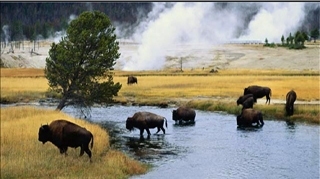|
Samuel Bassett
Source: “Nebraskans I Have Known, III
Samuel Clay Bassett” by Addison E Sheldon, Nebraska History Quarterly
Magazine
Where He Came From
Born in July 14, 1844 in New York.
Served in the Army during the Civil
War
Returned to New York where he farmed
until coming to Nebraska in 1871
What He Did
1871 - one of the original members of the Soldiers' Free Homestead Colony
Taught five terms of school, 20 years on the school board of
Dist. 8
1871 – secretary of the first Republican County Convention
First trip to a Republican State Convention – All delegates
were provided free tickets to ride the Railroad
to get there and then were expected to vote as the railroad said.
1875 – one of founders and first officers of Buffalo County Agricultural
Society [fair board]
1905 – Appointed secretary of the State Board of Agriculture (state
fair)
1885 & 1911 - member of the state legislature
1885 – one of founders and first president of the Nebraska Dairymen’s
Association. This organization was instrumental in the revolution of
Nebraska from a grain state to “cow country”
1910 – one of the leaders in founding of “The Farmer’s Congress” an
association where farmers of both radical and conservative opinions could
meet and debate the issues in a friendly format, helping to pave the way for
changes in farm society.
1912 - charter member of the Nebraska Pure Grain and Seed Growers'
Association
charter member and president of the Gibbon Library Association
1910-12
1916 - charter member and first president of the Nebraska Hall of
Agricultural Achievement
member of the State Historical Society board for 20 years;
vice president 1909-15 [6 years]
His interests were agricultural, political and historical
Bassett was a writer
Started with letters to local newspapers, speeches
wrote many articles for the State Historical Society magazine
Wrote two-volume History of Buffalo County
1914-1923 – Wrote “Echo Farm Musings” a column which appeared each Monday
morning in the Nebraska State Journal.
Imagination and Humor
Liked to surprise his friends – put friends initials in adhesive tape on
Jonathan apples so when they ripened the initials would stand out.
Once when up on ladder in orchard doing this he fell, injured his spine, and
thereafter was confined to his home.
Now he read a great deal and wrote. Developed a religious philosophy which
was nature based. His many friends from across the state would stop in to
visit.
He died March 4, 1926
1926 – his portrait was hung in the Nebraska Hall of Agricultural
Achievement
Sheldon Meets Bassett
1897 legislative session.
Bassett was secretary of the Nebraska
Dairymen’s Association
Sheldon was a member of the House
Finance, Ways and Means Committee.
The issues before them were:
1. Request for $2000 for support of
the Nebraska Dairymen’s Association.
2. Request for $6000 to establish a
Dairy Farm School on the Ag Campus of the State University.
Opposition to all requests for funding of new items in appropriation bills
Populists - legislative majority;
elected on a platform of rigid economy
Nebraska was just coming out of a
financial depression and crop failures
no government programs like in the
‘30’s.
Strong prejudice by farmers in Nebraska against “book larning”
Bassett was described by Sheldon as “a practicing teat-puller on his dairy
farm near Gibbon.”
(They were successful and the resulting Nebraska School of Agriculture
operated until 1929 when it merged with the College of Agriculture.)
Bassett in the State Legislature
- 1911 –
difficult decision on a proposed bill to call for vote on moving the state
capital out of Lincoln
City of Lincoln had voted out saloons in May 1910. The liquor power in
Nebraska wanted to punish the city by removing the capital.
State Constitution required a vote by the people.
Liquor interests drew up a bill that named the cities who wanted to be
capital.
People would vote for the city they
wanted.
If Lincoln did not get the majority
people did not want the capital in Lincoln
Probably none of the others would either
Lincoln would then be eliminated and not included in the follow-up election.
Kearney was an active candidate and political leaders here had it all
figured out how to win after Lincoln was eliminated.
Bassett saw through the plan - a vendetta by the liquor interests
1. He thought having the vote was bad
publicity for the state.
2. Travel and trade routes had already been built on the premise that
Lincoln was the permanent location of the capital.
3. He did not believe Kearney would be selected.
He
knew this was just a move by the “wets” to get Lincoln.
Pressure from lobbyist in Lincoln
Political friends and supporters in
Buffalo County visited his home
Day of the final vote - large package was handed to him on the floor of the
Legislature.
Contained a petition from home with
1200 signatures asking him to vote for the bill.
When his name was called, he stood up and said “No!”
[Needless to say, the people of Kearney and Buffalo County were very upset
and disappointed. They called him a traitor and a recall was suggested but
they got over it.]
1911 got bill passed for teaching agriculture in rural schools
And Also............
As we look at the beginning of the Christmas shopping next week ---
Dec. 11, 1907 – a department store in
Kearney was going to stay open until 9 p.m. for Christmas shopping
|

